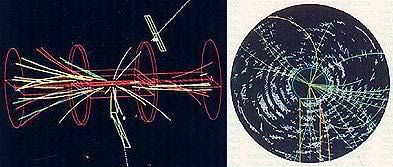
The following essay is from DOXA. I put it up because tonight on CARM I ran into an argument I've seen a number of times, but not until now did it dawn on me why people make it. I suddenly realized so few people understand why there was an atonement. The average Christian understanding is so screwed most of them can't explain it to another person. This is reflected in the answers to this argument.
The argument goes like this: So what if Jesus was crucified? what's the big deal? There re much worse ways to suffer. Crucification is bad but it is far from the worst thing that can happen to you. So why was it a sacrifice, I mean after all he is God, what would it matter to him if he dies? And he got to come back."
Now this is incredibly ignorant, but it occurs to me there re some resins for this kind of chaotic thinking, but also one big hidden premise. Before launching into that analysis, however, I would like to comment on the inadequacy of Christian understanding.
First, most Christians try to answer this out of a need for piety. They do not give a theological answer, they give a pious one. The pious answer can't be understood by modern people, they lack pious feelings, so it just makes it worse. The pious answer of course is to try and mount up the pain and make it seem so very much worse. O. Jesus suffered in hell and he suffers every minute and he's still suffering and he felt all the agony in the world. Of course it doesn't' really say that anywhere in the Bible. While I think this is true, and while my pious side feels the prier sense of reversions Dan gratitude to our savior for this work, we can't use this to answer the question because modern impiety can't understand the answer. They just hear us reiterating their hidden primes.
The other Christian answers are Propitiatory atonement, Substitutionary, or Moral government. These are the tree major ways of looking at the atonement. Propitiation means to turn away anger. This answer is also incomprehensible t moderns. God is so very angry with us that he can't stand the sight of us, he hats o stick Jesus between himself and us so he will see Jesus and turn away his anger. This just makes God seem like a red faced historical parent who couldn't comprehend the consequences of his creation when he decided to make it. Substitutionary atonement says Jesus took our place, he received the penalty our sins deserved. This comes in two verities. One is financial translation, Jesus paid the debt. the other is closer to moral government, Jesus was exiducted because he stepped in and took the place of the guilty party. Both of these are also problematic, because they really allow the guilty to get off Scott free and persecute an innocent person. The thing is in real Fe you could not go down to the jail and talk them into letting you take another prisoners place. WE can harp on how this is a grace so fine we can't undersigned it in the natural mind, and relapse into piety again singing the praises to God for doing this wonderful act, but it wont answer the atheists questions.
I realize that the view I hold to is a little known minority view. I know I'm bucking the mainstream. But I think it makes a lot more sense and actuals why there was an atonement. Before getting into it, however, I want to comment upon the atheist hidden premise. The explicit premise of the atheist argument is that atonement works by Jesus suffering a whole lot. If Jesus suffers enough then restitution is made. But wait, restitution for what? For our sins? Then why should Jesus suffer more than we do or more than our victims do? Why do antes seem to think, as was argued on CRAM tonight, that Jesus must suffer more than anyone ever has for the atonement to work? It's because the hidden premise is that God is guilty and the atonement is the time God pays for his own mistakes. Jesus has to suffer more than anyone to make up for what God has done, inconveniencing us by creating us.
The sickness of the modern mind can scarcely comprehend Christian theology now. I wonder if it isn't too late and we are just past the day when people in the West can really be saved?
I mean consider the idea that usually accompanies this argument: well he is God after all, a little torture death cant' hurt him. In the old days, when we had a culture that ran on Christian memories, people said how great that God would do this for us when he didn't have to! NOw the argument is "Of course he had to, it's the least he can do, after all I didn't asked to be born, so I'm entitled to whatever goodies can get in compensation." That's why I think the hidden premise is to blame God; its as though they are saying God has to suffer more than anyone to make up for the suffering he caued as creator. This sort of attitude is very troubling.
In any case, my view is the Participatory atonement. It was embraced by several church fathers and modern theologians supporting it are mentioned below:
I.The Atonement: God's Solidarity With Humanity.
A. The inadquacy of Financial Transactions
Many ministers, and therefore, many Christians speak of and think of Jesus' death on the cross as analogous to a financial transaction. Usually this idea goes something like this: we are in hock to the devil because we sinned. God pays the debt we owe by sending Jesus to die for us, and that pays off the devil. The problem with this view is the Bible never says we owe the devil anything. We owe God. The financial transaction model is inadequates. Matters of the soul are much more important than any monetary arrangement and business transactions and banking do not do justice to the import of the issue. Moreover, there is a more sophisticated model; that of the sacrifice for sin. In this model Jesus is like a sacrificial lamb who is murdered in our place. This model is also inadequate because it is based on a privative notion of sacrifice. The one making the sacrifice pays over something valuable to him to appease an angry God. In this case God is paying himself. This view is also called the "propitiation view" because it is based upon propitiation, which means to turn away wrath. The more meaningful notion is that of Solidarity. The Solidarity or "participatory" view says that Jesus entered human history to participate in our lot as finite humans, and he died as a means of identifying with us. We are under the law of sin and death, we are under curse of the law (we sin, we die, we are not capable in our own human strength of being good enough to merit salvation). IN taking on the penalty of sin (while remaining sinless) Jesus died in our stead; not in the manner of a privative animal sacrifice (that is just a metaphor) but as one of us, so that through identification with us, we might identify with him and therefore, partake of his newness of life.
B. Christ the Perfect Revelation of God to Humanity
In the book of Hebrews it says "in former times God spoke in many and verious ways through the prophets, but in these latter times he has spoken more perfectly through his son." Jesus is the perfect revelation of God to humanity. The prophets were speaking for God, but their words were limited in how much they could tell us about God. Jesus was God in the flesh and as such, we can see clearly by his character, his actions, and his teachings what God wants of us and how much God cares about us. God is for humanity, God is on our side! The greatest sign of God's support of our cause as needy humans is Jesus death on the cross, a death in solidarity with us as victims of our own sinful hearts and societies. Thus we can see the lengths God is will to go to to point us toward himself. There are many verses in the Bible that seem to contradict this view. These are the verses which seem to say that Atonement is propitiatory.
C. Death in Solidarity with Victims
1) Support from Modern Theologians
Three Major Modern Theologians support the solidarity notion of atonement: Jurgen Moltmann (The Crucified God), Matthew L. Lamb (Solidarity With Victims), and D.E.H. Whiteley (The Theology of St. Paul).In the 1980s Moltmann (German Calvinist) was called the greatest living protestant theologian, and made his name in laying the groundwork for what became liberation theology. Lamb (Catholic Priest) was big name in political theology, and Whiteley (scholar at Oxford) was a major Pauline scholar in the 1960s.In his work The Crucified God Moltmann interprets the cry of Jesus on the cross, "my God my God why have you forsaken me" as a statement of solidarity, placing him in identification with all who feel abandoned by God.Whiteley: "If St. Paul can be said to hold a theory of the modus operandi [of the atonement] it is best described as one of salvation through participation [the 'solidarity' view]: Christ shared all of our experience, sin alone excepted, including death in order that we, by virtue of our solidarity with him, might share his life...Paul does not hold a theory of substitution..." (The Theology of St. Paul, 130)An example of one of the great classical theologians of the early church who held to a similar view is St. Irenaeus (according to Whiteley, 133).
2) Scrtiptural
...all of us who were baptized into Christ Jesus were Baptized into his death.? We were therefore buried with him in baptism into death in order that just as Christ was raised from the death through the glory of the father, we too may live a new life. If we have been united with him in his death we will certainly be united with him in his resurrection.For we know that the old self was crucified with him so that the body of sin might be rendered powerless, that we should no longer be slaves to sin.--because anyone who has died has been freed from sin.Now if we have died with Christ we believe that we will also live with him, for we know that since Christ was raised from the dead he cannot die again; death no longer has mastery over him; the death he died to sin he died once for all; but the life he lives he lives to God. In the same way count yourselves dead to sin but alive to God in Christ Jesus.(Romans 6:1-5)
In Short, if we have united ourselves to Christ, entered his death and been raised to life, we participate in his death and resurrection thourgh our act of solidarity, united with Christ in his death, than it stands tto reason that his death is an act of solidarity with us, that he expresses his solidarity with humanity in his death.
This is why Jesus cries out on the cross "why have you forsaken me?" According to Moltmann this is an expression of Solidarity with all who feel abandoned by God.Jesus death in solidarity creates the grounds for forgiveness, since it is through his death that we express our solidarity, and through that, share in his life in union with Christ. Many verses seem to suggest a propitiatory view. But these are actually speaking of the affects of the solidarity. "Since we have now been justified by his blood, how much more shall we be saved from God's wrath through him! For if when we were considered God's enemies, we were reconciled to him through the death of his son, how much more, having been reconciled, shall we be saved through his life! What appears to be saying that the shedding of blood is what creates forgiveness is actually saying that the death in solidarity creates the grounds for reconciliation. IT says we were enemies then we were reconciled to him thorugh the death, his expression of solidarity changes the ground, when we express our solidarity and enter into the death we are giving up to God, we move from enemy to friend, and in that sense the shedding of blood, the death in solidarity, creates the conditions through which we can be and are forgiven. He goes on to talk about sharing in his life, which is participation, solidarity, unity.
D. Meaning of Solidarity and Salvation.
Jurgen Moltmann's notion of Solidarity (see The Crucified God) is based upon the notion of Political solidarity. Chrsit died in Solidarity wiht victims. He took upon himself a political death by purposly angering the powers of the day. Thus in his death he identifies with victims of oppression. But we are all vitims of oppression. Sin has a social dimension, the injustice we experience as the hands of society and social and governmental institutions is primarily and at a very basic level the result of the social aspects of sin. Power, and political machinations begin in the sinful heart, the ego, the desire for power, and they manifest themselves through institutions built by the will to power over the other. But in a more fundamental sense we are all victims of our own sinful natures. We scheme against others on some level to build ourselves up and secure our conditions in life. IN this sense we cannot help but do injustice to others. In return injustice is done to us.Jesus died in solidarity with us, he underwent the ultimate consequences of living in a sinful world, in order to demonstrate the depths of God's love and God's desire to save us. Take an analogy from political organizing. IN Central America governments often send "death squads" to murder labor unionists and political dissenter. IN Guatemala there were some American organizations which organized for college students to go to Guatemala and escort the leaders of dissenting groups so that they would not be murdered.
The logic was that the death squads wouldn't hurt an American Student because it would bring bad press and shut off U.S. government funds to their military. As disturbing as these political implications are, let's stay focussed on the Gospel. Jesus is like those students, and like some of them, he was actually killed. But unlike them he went out of his way to be killed, to be victimized by the the rage of the sinful and power seeking so that he could illustrate to us the desire of God; that God is on our side, God is on the side of the poor, the victimized, the marginalized, and the lost. Jesus said "a physician is not sent to the well but to the sick."The key to salvation is to accept God's statement of solidarity, to express our solidarity with God by placing ourselves into the death of Christ (by identification with it, by trust in it's efficacy for our salvation).
E. Atonement is a Primetive Concept?
This charge is made quite often by internet-skeptics, especially Jewish anti-missionaries who confuse the concept with the notion of Human sacrifice. But the charge rests on the idea that sacrifice itself is a primitive notion. If one commits a crime, someone else should not pay for it. This attack can be put forward in many forms but the basic notion revolves around the idea that one person dying for the sins of another, taking the penalty or sacrificing to remove the guilt of another is a premitive concept. None of this applies with the Participatory view of the atonement (solidarity) since the workings of Christ's death, the manner in which it secures salvation, is neither through turning away of wrath nor taking upon himself other's sins, but the creation of the grounds through which one declares one's own solidarity with God and the grounds through which God accepts that solidarity and extends his own; the identification of God himself with the needs and crys of his own creation.
F. Unfair to Jesus as God's Son?
Internet skeptics sometimes argue that God can't be trusted if he would sacrifice his son. This is so silly and such a misunderstanding of Christian doctrine and the nature of religious belief that it hardly deserves an answer. Obviously God is three persons in one essence, the Trinity , Triune Godhead. Clearly God's act of solidarity was made with the unanimity of a single Godhead. God is not three God's, and is always in concert with himself.







